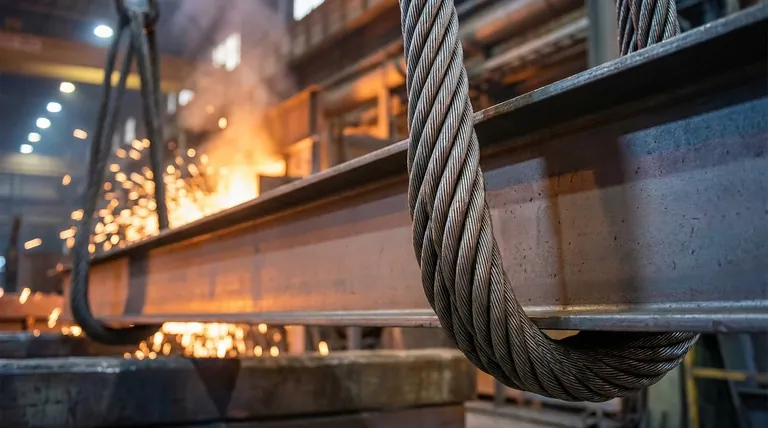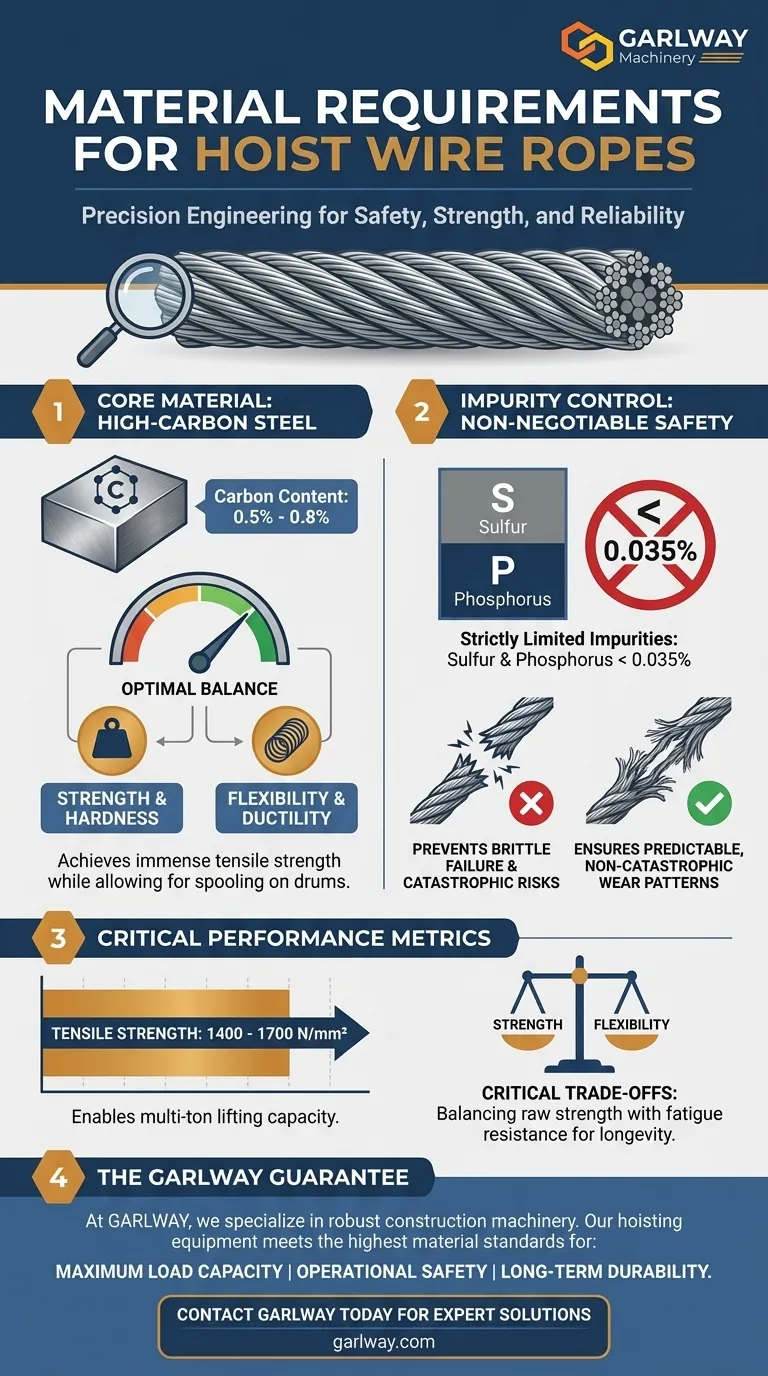The material integrity of a hoist's wire rope is dictated by a precise and non-negotiable set of requirements. These ropes are fundamentally engineered from high-quality carbon steel, specifically with a carbon content between 0.5% and 0.8%. To ensure the rope possesses the necessary toughness and avoids catastrophic failure, the content of impurities like sulfur and phosphorus is strictly limited to a maximum of 0.035%, enabling the material to achieve a tensile strength between 1400 and 1700 N/mm².
The selection of high-carbon steel for hoist ropes is a critical engineering compromise. The goal is to achieve immense tensile strength for lifting heavy loads while retaining enough toughness and ductility to prevent the rope from becoming brittle and failing without warning.

The Core Material: High-Carbon Steel
The foundation of a reliable wire rope is its base material. The choice of high-carbon steel is deliberate, designed to meet the extreme demands of hoisting applications.
The Role of Carbon Content
The specified carbon range of 0.5% to 0.8% is the sweet spot for creating a material that is both hard and strong.
Increasing carbon content in steel increases its strength and hardness, but it also reduces its ductility, or ability to deform without fracturing. This specific range provides the necessary strength to handle massive loads while retaining enough flexibility to be spooled on a drum.
Achieving High Tensile Strength
The material composition directly enables the final wire to reach a tensile strength of 1400 to 1700 N/mm².
This immense strength is what allows a relatively small diameter rope to safely lift multi-ton loads, forming the backbone of the hoist's operational capability.
Why Impurity Control is Non-Negotiable
While carbon provides strength, trace elements can just as easily destroy a rope's integrity. Controlling impurities is as important as specifying the primary alloy.
The Danger of Brittleness
The primary reason for limiting sulfur and phosphorus to less than 0.035% is to prevent brittleness.
A brittle rope is a catastrophic liability. Instead of showing signs of wear and fatigue, it can snap suddenly under load, providing no warning of imminent failure.
How Impurities Compromise Safety
Sulfur and phosphorus are particularly damaging as they promote different types of embrittlement within the steel's grain structure.
This can lead to a drastic reduction in the rope's toughness, making it susceptible to cracking under shock loads or in demanding environmental conditions.
Understanding the Trade-offs
A hoist rope is not simply the "strongest" material possible; it is a carefully balanced system where one property is often traded for another to achieve optimal performance and safety.
Strength vs. Flexibility
The primary trade-off is between raw tensile strength and flexibility. An extremely hard and strong wire can be too stiff to bend repeatedly around drums and sheaves without fatiguing and breaking.
The material must be tough enough to withstand repeated bending stresses over its entire service life.
The Goal: Predictable, Safe Performance
A key advantage of properly specified wire rope is its low likelihood of sudden breakage.
The material's ductility ensures that when the rope begins to reach the end of its life, it typically does so through predictable wear patterns, such as fraying or broken outer wires. This provides a clear visual indication that it's time for replacement, a critical feature for any safety-focused operation.
Making the Right Choice for Your Application
Understanding the material science behind your hoist rope empowers you to specify a component that aligns with your primary operational goal.
- If your primary focus is maximum load capacity: Prioritize a rope with a certified tensile strength at the higher end of the 1400-1700 N/mm² range, ensuring all material composition standards are verified.
- If your primary focus is operational safety: Emphasize strict adherence to the low impurity limits (<0.035% S and P), as this directly contributes to the toughness required for a predictable and non-brittle failure mode.
- If your primary focus is equipment longevity: Select a rope where the balance of strength and flexibility has been optimized, ensuring it can withstand the cyclic fatigue of your specific hoisting application.
Ultimately, specifying a wire rope based on these core material requirements ensures it is not just strong, but fundamentally safe and reliable.
Summary Table:
| Requirement | Specification | Key Purpose |
|---|---|---|
| Carbon Content | 0.5% - 0.8% | Balances high tensile strength with necessary flexibility and ductility. |
| Tensile Strength | 1400 - 1700 N/mm² | Enables the rope to safely lift multi-ton loads. |
| Impurity Limit (S, P) | < 0.035% | Prevents dangerous brittleness and ensures predictable, non-catastrophic failure. |
Ensure your lifting operations are built on a foundation of safety and reliability.
At GARLWAY, we specialize in providing robust construction machinery and components, including winches and hoists, for construction companies and contractors worldwide. Our expertise ensures that the wire ropes in your equipment meet the highest material standards for maximum load capacity, operational safety, and long-term durability.
Contact GARLWAY today to discuss your specific hoisting needs and let our experts help you select the right equipment for safe and efficient performance.
Visual Guide

Related Products
- Portable Concrete Mixer Machine Equipment for Mixing Concrete
- Ready Mixer Machine for Construction Ready Mix Machinery
- Commercial Construction Mixer Machine for Soil Cement Mixing Concrete
- Hydraulic Concrete Mixer Machine Cement Mixing Equipment for Mixture Concrete
- HZS75 Concrete Batching Plant Cement Mixer Price Concrete Mixer Bunnings Mixing Plant
People Also Ask
- What are the types of concrete mixtures? Choose the Right Mix for Structural Integrity
- Why is proper training important for electric hoist operators? Prevent Accidents & Boost Efficiency
- What should be considered in terms of transportation to avoid affecting construction progress? Master Logistics for On-Time Delivery
- How should you calculate the weight to be pulled to avoid exceeding the winch's capacity? Ensure Safe & Effective Recovery
- What does 'power out' mean in a hydraulic winch? Achieve Absolute Control When Lowering Heavy Loads
- What are the benefits of reduced noise and vibration in hydraulic towing winches? Enhance Safety & Lower Costs
- What should be checked before using an electric hoist? A 4-Step Safety Checklist for Operators
- What is the primary purpose of an electric hoist? Safely Lift Heavy Loads with Precision

















